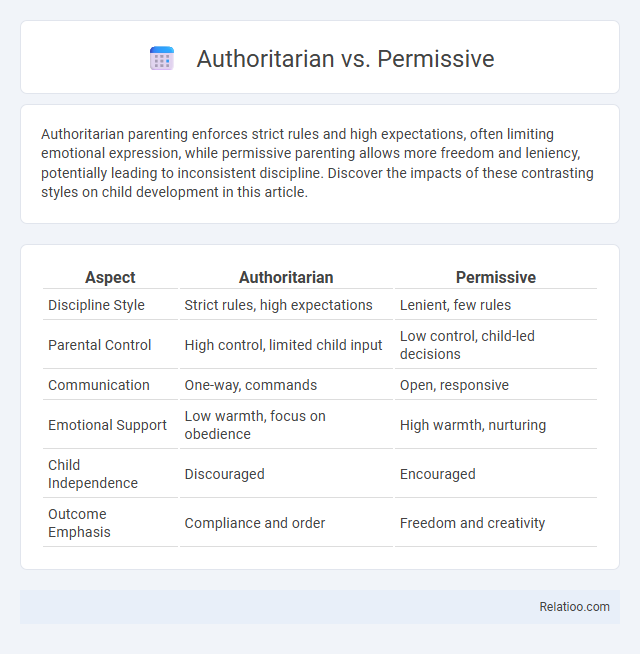Authoritarian parenting enforces strict rules and high expectations, often limiting emotional expression, while permissive parenting allows more freedom and leniency, potentially leading to inconsistent discipline. Discover the impacts of these contrasting styles on child development in this article.
Table of Comparison
| Aspect | Authoritarian | Permissive |
|---|---|---|
| Discipline Style | Strict rules, high expectations | Lenient, few rules |
| Parental Control | High control, limited child input | Low control, child-led decisions |
| Communication | One-way, commands | Open, responsive |
| Emotional Support | Low warmth, focus on obedience | High warmth, nurturing |
| Child Independence | Discouraged | Encouraged |
| Outcome Emphasis | Compliance and order | Freedom and creativity |
Understanding Authoritarian Parenting
Authoritarian parenting is characterized by strict rules, high expectations, and little warmth or responsiveness, prioritizing obedience and discipline over open communication. This style often results in children who are obedient but may struggle with self-esteem, social skills, and independence due to the lack of emotional support. Understanding authoritarian parenting involves recognizing its impact on child development, including potential challenges in emotional regulation and decision-making abilities.
Key Traits of Permissive Parenting
Permissive parenting is characterized by high responsiveness and low demands, where parents are nurturing and communicative but offer minimal discipline or control. Children raised with permissive parenting often enjoy freedom to make their own decisions but may struggle with self-regulation and authority. This style contrasts with authoritarian parenting's strict rules and expectations, and authoritative parenting's balance of responsiveness and firm boundaries.
Core Differences Between Authoritarian and Permissive Styles
The core difference between authoritarian and permissive parenting styles lies in discipline and control; authoritarian parents enforce strict rules and expect obedience without questioning, while permissive parents offer high warmth with few demands or consistent boundaries. Authoritarian parenting is characterized by high control and low responsiveness, often leading to children who are obedient but may struggle with self-esteem. Permissive parenting features low control and high responsiveness, which can result in children who are more creative but may face challenges with authority and self-discipline.
Impact on Child Development
Authoritarian parenting, characterized by strict rules and high demands, often results in children exhibiting lower self-esteem and social competence due to limited emotional expression. Permissive parenting, marked by high responsiveness but low discipline, can lead to children displaying poor impulse control and increased behavioral problems. Balanced parenting styles, blending firm boundaries with empathy, tend to foster better emotional regulation, academic success, and social skills in child development.
Emotional Outcomes in Children
Authoritarian parenting, characterized by strict rules and high expectations, often leads to children experiencing lower self-esteem and increased anxiety due to limited emotional expression. Permissive parenting, marked by leniency and few boundaries, can result in children struggling with self-discipline and emotional regulation, impacting their social development. Understanding your parenting style helps optimize emotional outcomes, fostering resilience and healthy emotional growth in children.
Academic Performance and Motivation
Authoritarian parenting, characterized by strict rules and high expectations, often leads to lower academic performance and decreased motivation due to fear of failure. Permissive parenting, marked by leniency and lack of structure, can result in inconsistent academic outcomes and reduced self-discipline in students. Your child's motivation and success are most positively influenced by an authoritative parenting style, which balances clear expectations with support and encouragement.
Discipline Approaches Compared
Authoritarian parenting emphasizes strict discipline with high demands and low responsiveness, relying on punishment and obedience to control behavior. Permissive parenting adopts a lenient approach with high responsiveness but low demands, often avoiding discipline and allowing children significant freedom. In contrast, authoritative parenting balances firm discipline with warmth and communication, promoting self-regulation and positive behavior through consistent expectations and support.
Long-term Psychological Effects
Authoritarian parenting often leads to children with lower self-esteem, higher anxiety, and difficulties in social adjustment over time. Permissive parenting correlates with poor self-discipline and increased risk of behavioral problems or substance abuse in adolescence and adulthood. Balanced parenting styles, such as authoritative parenting, tend to promote positive long-term psychological outcomes, including higher emotional regulation and better interpersonal skills.
Cultural Influences on Parenting Styles
Cultural influences shape parenting styles by dictating norms and values that inform authoritarian, permissive, or authoritative approaches. In collectivist societies, authoritarian parenting often prevails, emphasizing obedience and respect for authority, while individualistic cultures lean toward permissive or authoritative styles that promote autonomy and self-expression. Understanding these cultural contexts is crucial for interpreting parental behavior and child development outcomes across diverse communities.
Choosing the Right Approach for Your Family
Selecting the right parenting style depends on your family's unique needs, values, and goals for child development. Authoritarian parenting emphasizes strict rules and discipline, leading to well-behaved but potentially less independent children, while permissive parenting offers high warmth and freedom, fostering creativity but sometimes resulting in lack of boundaries. A balanced approach, often called authoritative, combines clear expectations with nurturing support, promoting healthy emotional growth and social competence in children.

Infographic: Authoritarian vs Permissive
 relatioo.com
relatioo.com